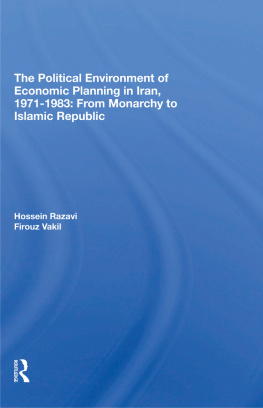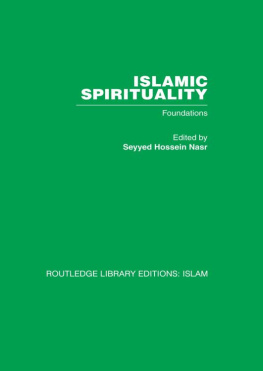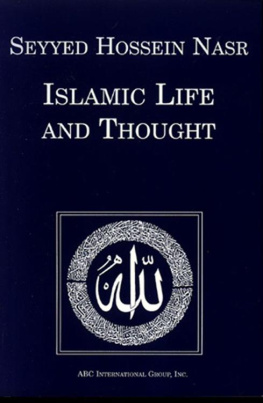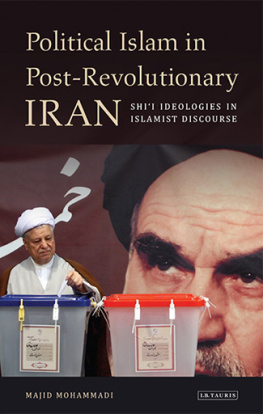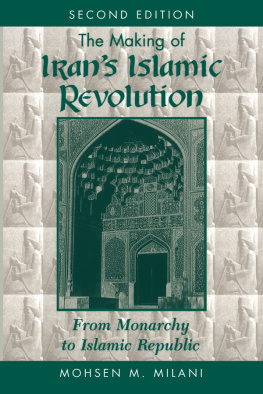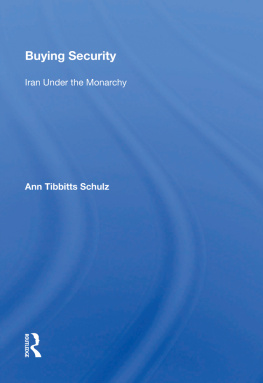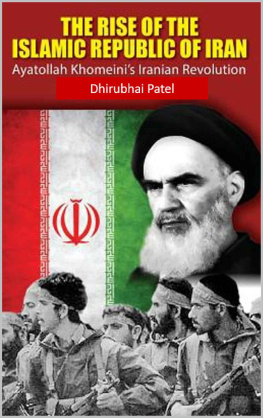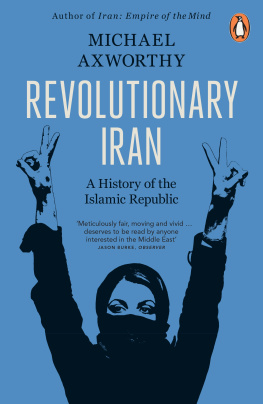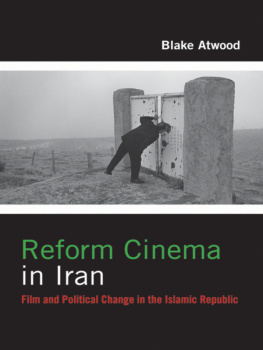The Political Environment of Economic Planning in Iran, 1971-1983
Also of Interest
The Problems of Arab Economic Development and Integration, edited by Adda Guecioueur
Rich and Poor States in the Middle East: Egypt and the New World Order , edited by Malcolm H. Kerr and El Sayed Yassin
Local Politics and Development in the Middle East , edited by Louis J. Cantori and Iliya Harik
The New Arab Social Order: A Study of the Social Impact of Oil Wealth, Saad Eddin Ibrahim
OPEC: Twenty Years and Beyond, edited by Ragaei El Mallakh
A Concise History of the Middle East, Second Edition, Revised and Updated, Arthur Goldschmidt, Jr.
Economic Growth and Development in Jordan, Michael P. Mazur
Mexico's Dilemma: The Political Origins of Economic Crisis, Roberto Newell G. and Luis Rubio F.
The Gulf and the Search for Strategic Stability: Saudi Arabia, the Military Balance in the Gulf and Trends in the Arab-Israeli Military Balance, Anthony H. Cordesman
Industrial Progress in Small Oil-Exporting Countries: The Prospect for Kuwait, edited by Maurice Girgis
The Foreign Policies of Arab States, Bahgat Korany and Ali E. Hillal Dessouki
Available in hardcover and paperback.
Westview Special Studies on the Middle East
The Political Environment of Economic Planning in Iran, 1971-1983: From Monarchy to Islamic Republic Hossein Razavi and Firouz Vakil
Based on both research and first-hand experience, this book provides a politico-economic analysis of the operation of Iran's economy before and after the revolution of February 1979. The authors discuss the function and effectiveness of economic planning during the shah's tenure and relate the shortcomings of plan preparation and implementation to the explosive psycho-economic instability of the regime. They then discuss the institutional problems that the revolutionary regime has been facing in operating the economy and foresee the possible consequences of its failure to appropriately deal with these problems. Finally, analyzing the economic postures of important opposition groups, the authors outline future prospects for economic planning in Iran.
Dr. Hossein Razavi, a senior consultant at Ernst & Whmney in Washington, D.C., served as a bureau director at the Plan and Budget Organization of Iran from 1976 through November 1981. Dr. Firouz Vakil is currently a country economist at the World Bank. He held several positions at the Plan and Budget Organization of Iran, including that of under secretary for informatics, during the 1973-1979 period.
The Political Environment of Economic Planning in Iran, 1971-1983: From Monarchy to Islamic Republic
Hossein Razavi and Firouz Vakil
First published 1984 by Westview Press
Published 2019 by Routledge
52 Vanderbilt Avenue, New York, NY 10017
2 Park Square, Milton Park, Abingdon, Oxon OX14 4RN
Routledge is an imprint of the Taylor & Francis Group, an informa business
Copyright 1984 by Taylor & Francis
All rights reserved. No part of this book may be reprinted or reproduced or utilised in any form or by any electronic, mechanical, or other means, now known or hereafter invented, including photocopying and recording, or in any information storage or retrieval system, without permission in writing from the publishers.
Notice:
Product or corporate names may be trademarks or registered trademarks, and are used only for identification and explanation without intent to infringe.
Library of Congress Cataloging in Publication Data
Razavi, Hossein.
The political environment of economic planning in
Iran, 1971-1983.
(Westview special studies on the Middle East)
Bibliography: p.
1. IranEconomic policy. 2. IranEconomic conditions
1945- . 3. IranPolitics and government1941-1979.
4. IranPolitics and government1979-
I. Vakil, Firouz. II. Title. III. Series.
HC475.R39 1984 338.955 84-3635
ISBN 13: 978-0-367-29499-1 (hbk)
The major part of the material presented in this book is based on official and unofficial interviews and discussions that we have had with many employees of the Plan and Budget Organization of Iran. We are most indebted to these colleagues, whose names are too numerous to include here.
We have benefited from the comments of several scholars who reviewed earlier versions of the manuscript. In particular, we are grateful to Fereidun Fesharaki for his invaluable suggestions on the organization of the book and to Salah El-Serafy and Hassan Ali Mehran for their constructive comments on . However, the responsibility for any errors of fact and judgment is solely our own.
Finally, we want to thank Mary Murtha for her invaluable editorial assistance on several chapters of the manuscript and Libby Barstow of Westview Press for her meticulous editing of the entire manuscript.
Hossein Razavi
Firouz Vakil
1
Recent Political Events: An Overview
From 1941 to 1979 Iran was ruled by Mohammad Reza Shah Pahlavi, whose regime was toppled in February 1979 by a coalition of religious, nationalist, and leftist groups. During the course of the upheaval, the leader of the religious opposition, Ayatollah Rouhollah Khomeini, moved to the center of the opposition movement and headed the revolution against the shah. After the fall of the shah, Khomeini took control and appointed a provisional government to run the country. A referendum in March 1979 provided Khomeini with a mandate to establish an Islamic republic to replace the monarchy. Since then, the Iranian political environment has been subject to severe power struggles among those factions that had previously united to overthrow the shah's regime.
The political history of Iran during the nineteenth and twentieth centuries has been extensively analyzed. Therefore, this chapter will neither repeat nor summarize the literature; nor will it evaluate or trace the historical roots of political events. Rather, our purpose is to highlight and analyze those political developments that serve to frame our discussion of the economy's management in other chapters of this book.
Mohammad Reza Pahlavi's reign began in 1941 when his father, Reza Shah, abdicated under pressure from foreign forces (Britain and the Soviet Union). "The fall of Reza Shah ended the politics of state control; it had begun the politics of social conflict."
Unlike his father, the young shah adhered to the provisions of the constitution, which provided for government by a cabinet responsible to a freely elected parliament. Many political prisoners who had been arrested during Reza Shah's tenure were now released from jail, and a relatively free press was revived.
An opposition group to the government, the pro-Soviet Toudeh party, was formed; its main center of activity was the northern part of Iran, and it advocated radical politico-economic changes. The British, on the other hand, encouraged Sayyed Zia Eddin, a former prime minister, to form the National Will party, a right-wing conservative party that often advocated a return to old Islamic traditions. Elections in 1943 resulted in a new political spectrum in the parliament: Both the right (National Will party) and the left (Toudeh party) were able to send representatives. Between these two groups was a nationalist group led by Mohammad Mossaddegh, who was known for his opposition to any foreign influence.

